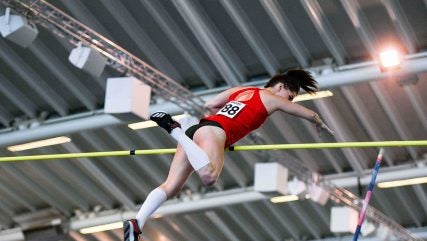
UK
Emily Macdonald, the Textile Services Association (TSA) events coordinator, is training to make the Spanish downhill skeleton team and hopes to take part in upcoming international competitions this winter. Skeleton is a winter sport in which a person lying prone rides a small sled, known as a skeleton or bobsled, down a frozen track. In fact, it was sport, in the shape of pole-vaulting, that brought her to the TSA in the first place. “I used to train with Emma Andersson the TSA’s finance and membership director, and when I was looking for a change of career she suggested applying. Luckily, I got the job,” said Macdonald.
Pole-vaulting is all about hanging on while you go up, while the skeleton is about hanging on while you plummet downhill – is that a metaphor for her work with the TSA? “No, that’s all up,” she says. “Obviously I have a passion for sport and one of the great things about working with the laundry industry is that people are very passionate about their industry.”
But why the Spanish team? “I have a few different bits of heritage – as well as being British on both sides of my family, my dad’s side of the family is Spanish and my mum’s side of the family is Polish!
“I’ve always had a very strong connection to my Spanish heritage (despite my name not being very Spanish, although one of my middle names is Maria – named after my Spanish grandmother), so it’s very exciting to be part of the team,’ said Macdonald.
Macdonald’s role is to organise events and training for the TSA and its members – her most recent task being the association’s Spring Conference. “Feedback was great and it went well, I think,” she said. “We covered a huge variety of topics – from the DMU research into hygiene standards and testing to the impact of Pasha the Pillowcase (a campaign to encourage laundry and hospitality to respect linden and thereby extend its life). There’s a huge amount of work involved in advance when setting a conference, of course, but it’s then a real challenge to keep on top of everything while it’s happening. Luckily the TSA team are very supportive and we all work together when required –especially at the conference.”
The TSA spends significant time on research and talking to members to find out what they need and want in terms of training and events. “For example, we changed the conference from a one day to a two-day event, directly as a result of feedback from members,” Emily says. “The new format works well and gives delegates more time not only to take in the presentations and workshops, but also to network.”
Previously Emily worked at Legoland in customer service so how does the laundry industry compare? “It’s really cool. There are so many facets to the industry, and yet ultimately it’s all about the people. I’m lucky because I get to talk to and meet them on a regular basis.
“I’m really proud of our events and also of how the association is leading the way in areas such as diversity and mental health. It’s very rewarding to be a part of all that.”
And the skeleton? “The team at the TSA have been very supportive – as have people in the industry as a whole,” said Macdonald. “Obviously to get into a national team you have to give 100% during training – and I make sure I give 100% to my work, too.”
“The TSA is a small team,” says David Stevens, CEO of the association. “Before Emily joined there were just three of us – Emma, Shyju Skariah, our director of programmes and projects, and myself. So it was very important that she fitted in. She does a brilliant job and is a real team player. We’re also very proud of her sporting achievements and we’re happy to help her, for example with flexi working, wherever we can.”
The TSA is the trade association for the textile care services industry. The TSA represents commercial laundry and textile rental businesses. Membership ranges from family-run operations through to large, multi-national companies. Visit www.tsa-uk.org for more information.






